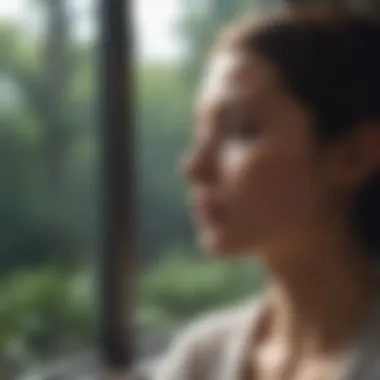Understanding the Complexities of Feeling Stuck in Marriage


Intro
Feeling stuck in a marriage is more common than many realize. It often brings a mix of confusion, frustration, and sadness. Numerous factors contribute to this feeling, including unfulfilled expectations, emotional distance, and stunted personal growth. Understanding these underlying dynamics can shed light on the emotional landscape of married life. This article aims to unpack these complexities, guiding readers through the journey of self-exploration and relationship understanding.
Recognizing the feeling of being stuck is the first step towards addressing the issue. Many individuals may experience this sensation but struggle to articulate it. It is important to understand that feeling stagnant does not always signal the end of a marriage; rather, it can prompt a deeper examination of both individual needs and mutual goals.
As we navigate through this topic, we will explore the emotional toll it takes on both partners, the importance of effective communication, and potential paths toward resolution. Additionally, we will delve into specific strategies to aid in fostering personal growth within the confines of marital commitments. By providing insights and avenue for reflection, individuals can better articulate their feelings and seek the necessary changes in their relationships.
The journey of understanding the feeling of being stuck requires courage and honesty. Acknowledging the complexity helps pave the way for transformative experiences.
"Relationships are like a dance, requiring both partners to move in unison and adapt to each other’s rhythm."
Prelims
Feeling stuck in a marriage is a complex and poignant emotional experience. This sensation can arise from various elements, often intertwining psychological aspects and relationship dynamics. Understanding this feeling is crucial because it serves as a pivotal point for many individuals. Recognizing the roots of these emotions can help both partners navigate through their relationship challenges.
In this article, we will elucidate the intricate layers of feeling trapped in a marital context. We will explore why such feelings are common and what psychological and relational factors contribute to them. By dissecting these themes, individuals can gain clearer insight into their experiences and how to address them. This understanding can foster personal growth, improve communication, and lead to healthier relationships.
Defining the Feeling of Being Stuck
The feeling of being stuck in a marriage often manifests as a sense of entrapment. Individuals may experience a lack of personal growth, emotional disengagement, or dissatisfaction with their partnership. This emotional impasse can be exacerbated by unresolved conflicts or unmet needs, leading to frustration and isolation.
When one feels stuck, it can often mean that both partners are simply going through the motions, without genuine connection or joy. This feeling is not merely about discontent; it explores deeper existential questions about identity, purpose, and commitment. Recognizing these feelings can be the first step towards improvement.
Why This Feeling Is Common in Marriages
The sensation of being stuck is not unusual in marriages. Several factors contribute to its prevalence. First, long-term commitments can cause individuals to lose sight of their personal aspirations or desires. The daily grind often overshadows the initial excitement and passion of the relationship.
Additionally, many couples fall into predictable patterns over time. Routine behaviors and conversations may transform into mere rituals. These patterns can hinder open dialogue about needs, aspirations, and emotional states. Consequently, partners may feel increasingly distanced from one another.
Cultural pressures can also play a significant role. Societal expectations surrounding marriage often promote an idealized version of union, which may not accurately portray the complexities involved. When reality deviates from these ideals, disappointment can ensue, deepening feelings of stagnation in the marriage.
Ultimately, acknowledging these dynamics can be a powerful first step towards breaking free from the confines of feeling stuck.
Psychological Factors at Play
Understanding the psychological factors involved in feeling stuck in a marriage is essential. These elements shape how individuals perceive their experiences and how they respond to challenges within the relationship. When both partners lack awareness of these factors, feelings of resentment and disconnection can easily develop.
Self-Reflection and Personal Identity
Self-reflection plays a significant role in understanding feelings of being trapped. It compels individuals to examine their values, aspirations, and overall contributions to the marriage. Often, one partner may feel they have sacrificed personal goals for the sake of the relationship. This can lead to feelings of frustration or loss of identity.
In exploring personal identity, it becomes crucial to assess whether individuals recognize their authentic selves within the marital framework. Are they genuinely expressing their needs, desires, and boundaries? Those who neglect this aspect may experience a sense of disorientation and doubt. By engaging in self-reflection, it encourages couples to discuss and reassess their personal identities, leading to potential growth and reconciliation.
Expectation vs. Reality


Marriages often begin with idealistic expectations. Partners envision a future together filled with happiness and unity. However, reality can be starkly different. Discrepancies between expectation and reality contribute to the feeling of stagnation. When partners identify differing values or incompatible priorities, disappointment can fester.
Recognizing this gap is vital. It allows couples to openly address their unrealistic expectations and find common ground. Adjusting these expectations doesn't mean lowering standards. Instead, it involves fostering a more nuanced understanding of what a marriage entails. It sets the stage for resculpting shared values and enhancing mutual support within the relationship.
Fear of Change
Fear of change often inhibits couples from addressing their feelings of being stuck. Change can bring uncertainty, and many individuals gravitate toward complacency rather than confronting uncomfortable situations. This fear can manifest in various forms - from the worry about financial stability to the fear of emotional vulnerability.
To overcome this fear, it's essential to acknowledge it openly. Discussing apprehensions can diminish their power. Couples can benefit from setting incremental goals, making change less daunting. Acknowledging the potential for growth and fostering a resilient companionship is crucial. Understanding that change can lead to personal and relational fulfillment can shift perspectives away from stagnation.
"Be the change that you wish to see in the world." - Mahatma Gandhi
Navigating these psychological factors enables couples to gain clarity and make informed decisions about their relationship. Whether it's through self-reflection, aligning expectations, or overcoming fears, recognizing these underlying issues can pave the way for constructive dialogue and healthier relationship dynamics.
Relational Dynamics
Understanding the relational dynamics within a marriage is essential when examining the feeling of being stuck. These dynamics refer to the patterns of interaction between partners that shape their relationship. They influence how individuals communicate, resolve conflicts, and connect emotionally. Focusing on relational dynamics can unveil underlying issues contributing to feelings of entrapment and dissatisfaction.
Communication Breakdowns
Effective communication is the backbone of any healthy relationship. When communication deteriorates, partners may feel isolated and misunderstood. Misunderstandings can arise from assumptions or lack of clarity in expressing thoughts and feelings.
When partners do not actively listen to each other, the chances for resolution diminish. It's vital to practice open and honest dialogue. By acknowledging each other's perspectives, partners can find common ground. Regularly scheduling "check-ins" can ensure that both partners feel heard and valued. Taking small steps to improve communication can lead to meaningful improvements in the relationship.
Conflict Patterns
Conflicts are inevitable in any marriage. However, how couples deal with disputes can have lasting effects on their marital satisfaction. Many relationships fall into negative conflict patterns where arguments become cyclical and unproductive. This often leads to unresolved issues festering over time.
Recognizing these patterns is important. Couples can reflect on how they argue and identify triggers that lead to escalation. Utilizing techniques such as taking a timeout during heated moments or focusing on collaborative problem-solving can be beneficial. It is also helpful to engage in regular discussions about less controversial topics, allowing individuals to practice peaceful discussions.
Emotional Disconnect
Emotional disconnect occurs when partners feel detached from one another. This distance can create feelings of isolation and contribute to a sense of being stuck. Partners may withdraw due to unresolved issues or stressors in their lives, leading to a lack of emotional intimacy.
To address emotional disconnection, it is important to foster closeness in the relationship. Engaging in shared activities or hobbies can rekindle a sense of partnership. Furthermore, dedicating time for intimate conversations without distractions also helps strengthen emotional bonds.
"Ignoring emotional needs can lead to significant relational distress. It is crucial to prioritize emotional health in marriage."
Recognizing and addressing relational dynamics is vital for moving forward in a marriage. By improving communication, understanding conflict patterns, and reconnecting emotionally, couples can pave the way for a more fulfilling partnership.
Implications of Feeling Stuck
Feeling stuck in a marriage is not just an individual experience; it bears significant implications for all involved parties. It can shape the mental health of both partners, affect the well-being of children, and extend into social dimensions that alter relationships with friends and family. Understanding these implications is crucial for navigating the complexities associated with this emotional state. This section will delve into the specific impacts that arise from feeling trapped in a marital situation.
Impact on Mental Health


The sensation of being stuck can lead to a multitude of mental health issues. It’s common for individuals feeling this way to experience feelings of anxiety, depression, and reduced self-esteem. When expectations are unmet and personal growth is hindered, a sense of hopelessness may ensue. The psychological toll can manifest through:
- Constant ruminating thoughts about the relationship
- Difficulty concentrating on daily tasks
- Instances of emotional outbursts or withdrawal
A vicious cycle can form, where mental health struggles exacerbate marital issues, leading to further feelings of entrapment. Many individuals may resort to unhealthy coping mechanisms, such as substance abuse or emotional detachment, which can further deteriorate overall well-being.
Effect on Children
Children in homes where parents feel stuck can often sense the emotional tension. This impacts their development and emotional health. There are several repercussions that may arise, including:
- Behavioral Issues: Kids may display increased anger or anxiety as they internalize the stress at home.
- Academic Performance: Struggles at home can translate into poor performance in school.
- Perspective on Relationships: They may develop a skewed understanding of relationships, believing that unhappiness is a norm in marriage.
It is important to recognize that children often mimic the emotional responses observed in their parents. Therefore, a marriage much marked by dissatisfaction can have long-lasting effects on children's perspectives and behaviors.
Social Consequences
The sense of being stuck in a marriage can also influence social relationships outside the home. Couples may find it challenging to engage with their friends and family, leading to:
- Isolation: Feeling discontent may result in withdrawing from social activities, causing further loneliness.
- Altered Friendships: Friendships can change dramatically, as friends may feel the strain and distance manifests in their interactions.
- Judgment or Misunderstanding: Others may not fully understand the complexities of being in a troubled marriage, leading to potential stigma or pressure to stay together despite the risk to personal health.
It's crucial to acknowledge that the implications of feeling stuck can ripple through the fabric of family and social connections, creating an environment where negativity thrives.
By understanding these implications, couples can initiate conversations about their feelings and consider professional help or intervention.
When to Seek Help
Recognizing the need for external support in a marriage is crucial, especially when feelings of being stuck persist. This phase can be daunting, but it might also clear the path toward deeper understanding and resolution. Seeking help is not a sign of weakness; rather, it illustrates a commitment to improving the relationship. It addresses the complex emotions both partners may experience and aims to foster a healthier environment.
Deciding to seek help often arises from distress. When daily interactions feel overwhelmingly negative or when communication becomes a constant struggle, intervention may be necessary. The earlier help is sought, the better the chance to rediscover harmony. Professional support can serve as a catalyst for change. It encourages open dialogue and helps uncover underlying issues that may otherwise remain buried.
Signs That Professional Guidance Might Be Needed
Certain indicators signal that it may be time to involve a professional. These signs include:
- Continuous feelings of frustration – If one or both partners consistently feel unsatisfied, this indicates deeper issues at hand.
- Reoccurring conflicts – Frequent arguments, especially about the same topics, suggest unresolved matters.
- Emotional withdrawal – When partners start to disconnect emotionally, isolation can deepen the feeling of being stuck.
- Increased resentment – A growing sense of bitterness regarding sacrifices made for the relationship can be damaging.
- Lack of intimacy – Physical and emotional intimacy bears relevance in marriage; its absence signals discontent.
- Doubt about the future – If partners constantly question the long-term viability of their marriage, help may provide clarity.
Seeking professional help can illuminate paths forward that couples may not see on their own.
Types of Professionals to Consider
Finding the right professional can significantly influence the journey towards healing. Here are some options:
- Marriage and Family Therapists: These specialists focus on relationship dynamics, helping couples navigate through issues with structured guidance.
- Licensed Professional Counselors: They provide individual or couple counseling, assisting in developing effective coping strategies.
- Psychologists: Their expertise can help address psychological factors contributing to marital struggles.
- Clergy or Spiritual Advisors: For some, faith-based perspectives may provide meaningful support and guidance.
- Coaches: Relationship coaches may offer practical advice and actionable strategies without the clinical focus of therapists.
Each type of professional brings unique perspectives, which can enhance the understanding partners have of their situation. Choosing one that aligns with personal needs and comfort is imperative.


Strategies for Navigating This Phase
Navigating the feeling of being stuck in a marriage requires a careful and thoughtful approach. Implementing strategic actions can redirect the emotional turmoil into constructive avenues for resolution and growth. The importance of these strategies lies in their ability to promote understanding, encourage healthy communication, and foster individual development. These actions not only address immediate conflicts but also create a more conducive environment for long-term happiness within the relationship.
Enhancing Communication Skills
Effective communication is the cornerstone of any successful relationship. In the context of feeling stuck, it becomes essential to articulate thoughts and feelings clearly. Misunderstandings often exacerbate feelings of entrapment. Partners should practice active listening, allowing each other to express grievances without interruption. This involves making eye contact, acknowledging feelings, and asking clarifying questions.
Additionally, expressing needs and concerns using "I" statements can significantly reduce defensiveness. For example, saying "I feel lonely when we don’t spend time together" instead of "You never spend time with me" shifts the focus to personal feelings rather than casting blame. This method opens a dialogue, laying the groundwork for a healthier exchange of ideas.
Setting Realistic Expectations
Setting realistic expectations can alleviate the pressure often felt in a stagnant marriage. Understanding that no relationship remains consistently exciting is vital. Couples should acknowledge that phases of discomfort or routine are normal and can be worked through. Rather than striving for perfection, a focus on shared goals and mutual support creates a more fulfilling partnership.
Couples may benefit from discussing their individual expectations from the marriage. This often helps to identify areas of discord and can clarify what each partner needs. By aligning their expectations, partners set the stage for cooperation and understanding, thereby reducing feelings of being stuck.
Engaging in Mindfulness Practices
Mindfulness practices can provide significant relief from the feeling of being stuck. Engaging in mindfulness helps individuals gain a clearer perspective on their emotions and circumstances. This approach encourages presence and awareness, allowing partners to observe thoughts and feelings without immediate reaction or judgment. Activities such as meditation, yoga, or even mindful walking can create moments of solace.
In a marital context, partners can try to engage in mindfulness exercises together. This shared experience promotes connection and appreciation for each other's struggles and feelings. Over time, mindfulness can cultivate patience and compassion, essential attributes in overcoming feelings of entrapment within the marriage.
Working on Individual Growth
Finally, focusing on individual growth can be a powerful way to navigate feelings of being stuck. Often, dissatisfaction within a marriage mirrors personal unhappiness. Engaging in individual pursuits such as hobbies, education, or personal therapy can foster a sense of autonomy. This personal development not only improves self-esteem but can also reignite interests that positively impact the relationship.
Encouraging each partner to embark on their own journeys allows each individual to bring renewed energy and perspective to the marriage. This growth can cultivate respect and admiration, essential ingredients for a flourishing partnership. Ultimately, individual growth creates synergy within the marriage, helping both partners feel more satisfied and engaged.
In summary, the journey of navigating feelings of being stuck in marriage is multifaceted. Employing strategies like enhancing communication skills, setting realistic expectations, engaging in mindfulness practices, and focusing on individual growth can effectively contribute to healing and improvement. Each element supports the others, cultivating a partnership that thrives on mutual respect and understanding.
Ending
In unraveling the intricate emotions tied to feeling stuck in a marriage, the conclusion holds essential significance. It is the distillation of the exploration undertaken in this article. This section serves as an opportunity for reflection, urging readers to consider their own experiences and perceptions within the framework of marital commitment.
Reflecting on Marital Commitment
Marital commitment often carries a weight of expectations and societal mandates. It’s crucial to consider what this commitment means at a personal level. For many, it may embody loyalty, love, and partnership. However, when one feels trapped, this commitment can also feel suffocating. It is a moment to ask: Are these expectations serving the relationship positively or casting a shadow over it?
Understanding the concept of commitment leads to the realization that it need not be static. Instead, it can evolve as individuals change over time. Couples might find value in reassessing their vows, not merely as binding promises, but as dynamic commitments that can adapt to their growth and challenges. Importantly, open dialogue can reaffirm the commitment, fostering an environment where both partners feel valued and understood.
The Path Forward
Finding a way forward is often daunting, yet it is essential for those feeling mired in their marital situation. Acknowledging feelings of being stuck is a pivotal step. It requires exploration of emotions without the overshadowing force of blame or resentment. Instead, approaching the situation through a lens of curiosity can lead to deeper understanding.
Potential pathways include:
- Seeking Professional Guidance: A marriage counselor can offer objective insights and strategies.
- Open Communication: Creating a safe space for dialogue can bridge gaps between partners.
- Reflective Practices: Journaling or meditation can aid individuals in processing their thoughts and feelings.
Remember, feeling stuck is a signal, not an end. It highlights opportunities for growth and change.
As couples navigate this complex terrain, they may discover that overcoming the sense of stagnancy may lead to deeper connections, renewed passions, and enhanced mutual respect. Ultimately, viewing the feeling of being stuck as a part of the marriage journey can guide couples toward meaningful transformation.







